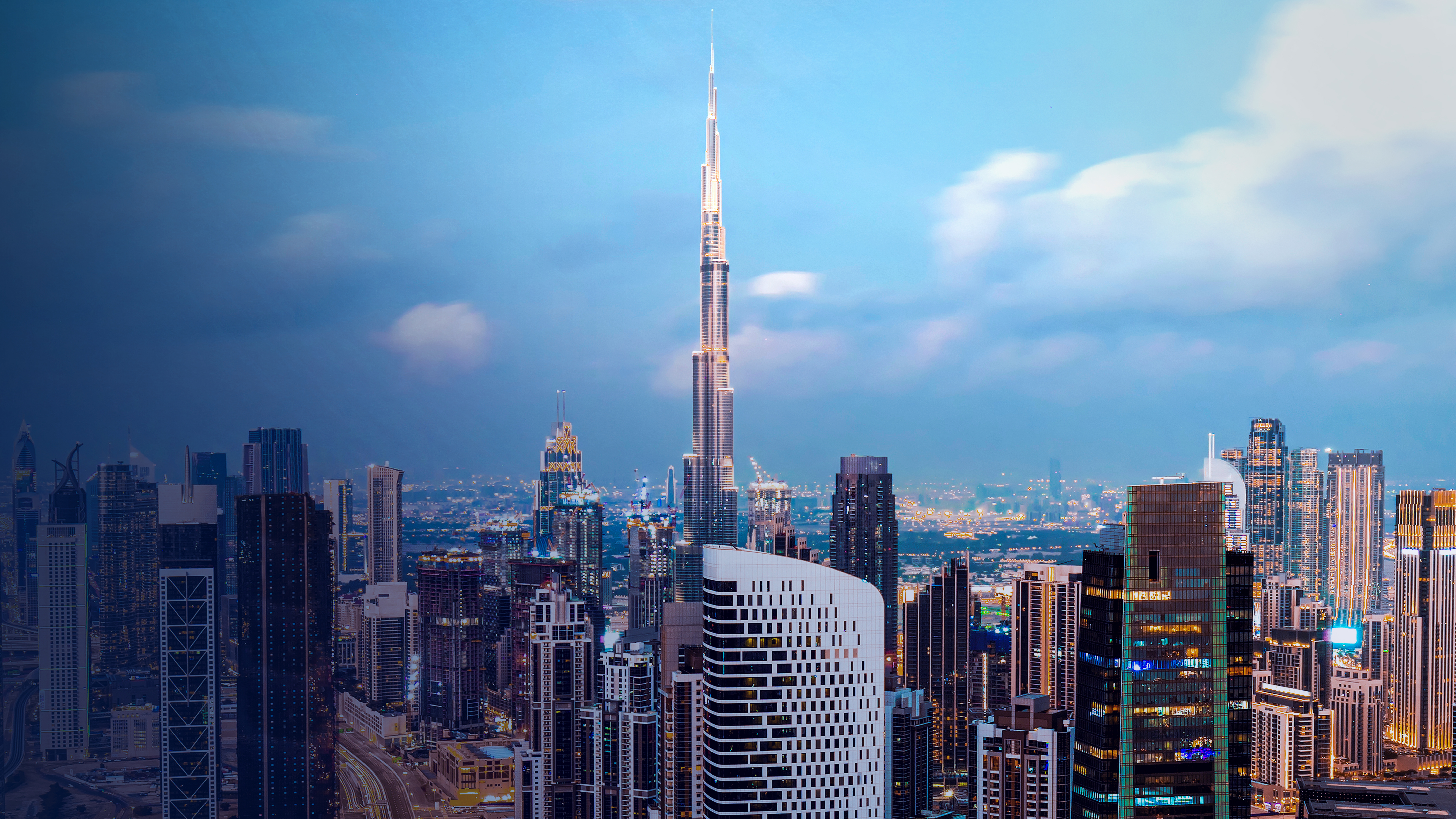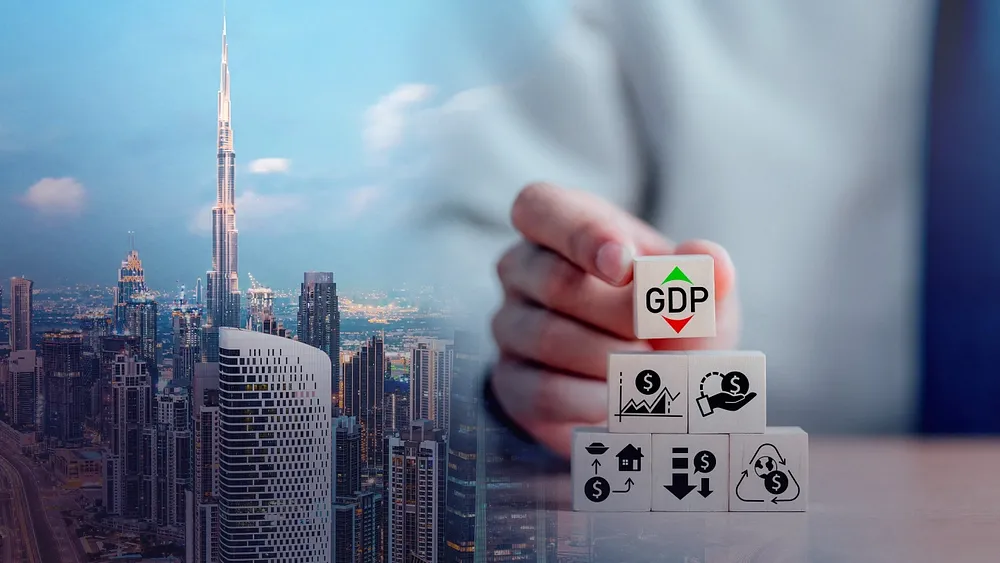Signature Collection
Explore SignatureDubai's GDP has once again exceeded expectations, maintaining a strong growth trajectory and strengthening its position among the world’s most competitive urban markets. This guide delivers a clear, sector-by-sector breakdown of the key forces behind Dubai’s record-setting quarter.
Whether you're an investor, business owner, or someone tracking Dubai market trends and news, this analysis will help you understand which sectors drove Dubai’s GDP growth in 2025 and where the most promising opportunities lie in the months ahead.
Dubai’s GDP Breaks Another Record
In the first half of 2025, the emirate’s GDP surged by 4.4% to reach AED 241 billion, while the second quarter alone saw a robust 4.7% rise, taking Dubai’s GDP to AED 122 billion, driven by strong sectoral growth. Let’s dive a little deeper and take a look at the immensely successful quarter as we draw closer to the end of the year.

The Dubai GDP expansion in Q2 2025 reflects the success of the emirate’s strategic vision under the leadership of His Highness Sheikh Mohammed bin Rashid Al Maktoum, Vice President and Prime Minister of the UAE, and Ruler of Dubai, with policies that prioritize innovation, sustainability, and global competitiveness.
The Dubai GDP 2025 growth also reinforces the progress of the Dubai Economic Agenda, D33, which aims to double the size of the economy within a decade and position Dubai among the world’s top three urban economies.
According to His Excellency Helal Saeed Almarri, Director General of the Dubai Department of Economy and Tourism (DET), the results underscore Dubai’s strong public-private partnerships and its consistent ability to attract global investors, entrepreneurs, and talent.
The Director General of Digital Dubai, His Excellency Hamad Obaid Al Mansoori, also emphasized the emirate’s growing digital strength, stating that the ongoing digital transformation has been instrumental in enhancing operational efficiency and boosting sustainable growth.
Which Industries Contribute Most to Dubai’s GDP in 2025?
The second quarter of 2025 observed widespread growth across key industries that underpin Dubai’s diversified economy.
Let’s now examine each sector in depth to understand the forces shaping Dubai’s growth:
| H1 2025 Growth | Q2 2025 Growth | Contribution to GDP (H1) | Value Added H1 | Value Added Q2 | |
|---|---|---|---|---|---|
| Human Health & Social Work | 20% | - | 1.4% | AED 3.3B | - |
| Construction | 8.5% | 14.9% | 6.7% | - | - |
| Real Estate | 7% | 6.4% | 8.2% | AED 19.8B | AED 19.8B |
| Financial & Insurance | 6.7% | 7.7% | 12.5% | AED 30.2B | AED 14.2B |
| Information & Communications | 5.3% | 7.4% | 4.5% | - | AED 5.5B |
| Accommodation/Food Services | 4.9% | 6.9% | - | - | - |
| Wholesale & Retail Trade | 4.4% | - | 23.8% | AED 57.4B | - |
As we see, Dubai’s economy continues to show strong, broad-based momentum across major sectors. Real estate remains a standout performer with a 40% increase in property sales compared to H1 2024, reflecting sustained investor confidence.
The D33 digital transformation strategy closely drives growth in the information and communications sector, reinforcing Dubai’s push toward a more innovative economy.
Tourism also continues to rise, with 9.88 million visitors in H1, representing a 6% increase, supporting steady gains in accommodation, food services, and wholesale trade. Together, these trends highlight a resilient and rapidly evolving economic landscape.
How Will Dubai’s GDP Growth Impact Investment Opportunities in 2026?
As Dubai advances its long-term development agenda, Dubai real estate remains a central pillar, supporting population growth, global business inflows, and the city’s position as a competitive urban hub.
Provident's Dubai Real Estate Market Report Q3 2025 already shows how this plays out on the ground: record transaction volumes, strong off-plan demand, and deep interest across apartments, villas, and townhouses, with both end-users and global investors active in the market.
A big pipeline of around 96,500 units expected to be handed over in 2026 across areas such as Arjan, Business Bay, City Walk, Dubai Creek Harbour, Dubai Hills, DAMAC Lagoons, and DAMAC Hills 2 will give investors more choice, allowing them to target high-growth corridors, family-centric suburban communities, and new mixed-use hubs rather than only traditional prime districts.
And because demand is still underpinned by population growth, tourism, and business inflows, this new supply is more likely to create selective opportunities.
What Commercial Real Estate Opportunities Arise From Dubai’s GDP Growth In 2025?
Dubai GDP in 2025 is creating several promising opportunities across the commercial real estate market. As key sectors such as trade, transportation, and e-commerce continue to expand, demand for modern commercial spaces in Dubai increases accordingly.
At the same time, high-growth industries, particularly those in information and communications, finance, and digital services, are driving a surge in demand for premium office space. This is especially evident in prime business districts and major free zones, where companies are seeking high-quality, tech-enabled workplaces.
The rise in Dubai’s GDP in Q2 2025 highlights the depth of its diversified economy, supported by strong performances in construction, real estate, and digital transformation, reinforcing the emirate’s long-term strength and continued appeal to investors in Dubai real estate.
Now is the ideal time to explore high-potential opportunities and invest in Dubai’s thriving property market.
FAQs
According to the Central Bank of the UAE (CBUAE), the nation’s real GDP is expected to expand by 4.9% in 2025, with growth anticipated to accelerate further to 5.3% in 2026.
Key drivers include expansion in the health, construction, and real estate sectors, as well as ongoing investments in digital transformation and infrastructure under the D33 agenda.
Healthcare, construction, real estate, financial services, information and communications, and tourism were the top-performing sectors contributing to Dubai’s strong GDP growth in 2025.
For more information, get in touch with us at Provident
 Apartments
Apartments Villas
Villas Townhouses
Townhouses Penthouses
Penthouses Commercial
Commercial See All Properties
See All Properties Commercial
Commercial Property Management
Property Management List Your Property
List Your Property Mortgages
Mortgages Conveyancing
Conveyancing Short Term Rentals
Short Term Rentals Property Snagging
Property Snagging Partner Program
Partner Program Currency Exchange
Currency Exchange PRYPCO
PRYPCO Ethnovate
Ethnovate Plots
Plots
